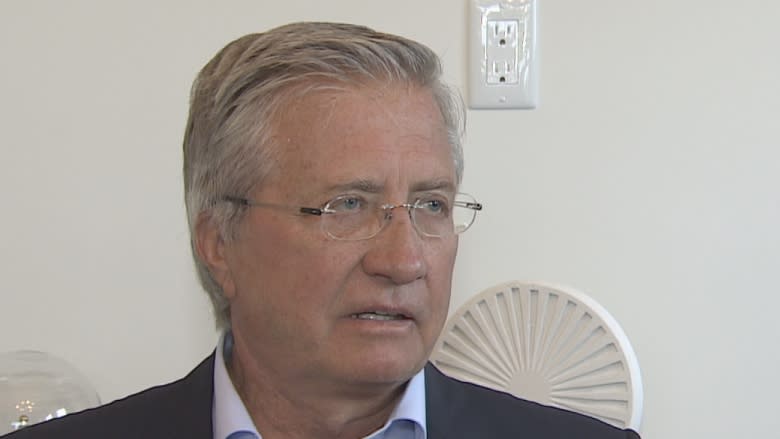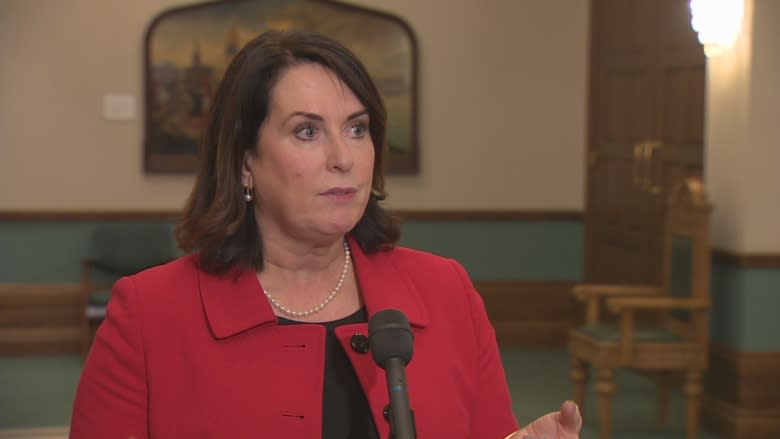Use oil and gas money to keep power rates in check, says Danny Williams
Revenues from equity stakes in offshore oil projects should be used to offset a looming spike in power rates in Newfoundland and Labrador, says Danny Williams.
"I have always said the logical way to keep electricity rates from doubling was to use Nalcor profits from oil and gas and hydro, and eliminate the return on equity to the province," Williams wrote in a statement to media on Friday.
The former premier is also pleased the aroma of negativity surrounding Muskrat Falls, a project he championed while in office, seems to be lifting.
"To see the Muskrat project become a reality, and to see the island for the first time in history linked up to North America is an enormous opportunity and something of which we should all be proud," Williams said in his statement.
Williams weighed in on the province's tense energy debate one day after Crown-owned Nalcor held its annual general meeting in St. John's, and his tone was noticeably upbeat.
Instead of referring to Stan Marshall as the "boondoggled buffoon," as he did in a scathing attack 10 months ago, Williams praised Nalcor's president and CEO.
"I was so pleased yesterday to finally hear the Nalcor CEO acknowledge the positive aspects of the Muskrat Falls project, and the ways in which it will ultimately benefit the province," Williams wrote.
Marshall took over as Nalcor CEO two years ago, and immediately criticized the decision to build Muskrat Falls, acknowledging that it is a boondoggle and that it was not the right choice for the province's energy needs.
That drew a sharp rebuke from Williams, who questioned how Marshall was able to keep his job.
Pocketbook pain
But the project is now 90 per cent complete, and Marshall's tone has softened.
However, he once again suggested Thursday that power rates are poised to double in the coming years as the wildly over-budget and behind schedule project is completed.
"It will be on that order of magnitude," Marshall said.
Natural Resources Minister Siobhan Coady said efforts are underway to try to mitigate rates, but offered no clear plan as to how that will happen, saying only that it's important rates remain on par with those in the Maritime provinces.
But Williams said the answer is clear: Nalcor is raking in big profits from equity stakes in oil projects like the White Rose Extension, Hibernia South Extension and Hebron, and those profits should be used to keep electricity rates from skyrocketing.
Nalcor earned $272 million in revenue from offshore oil last year, up substantially from the previous year, and that figure is only expected to grow as projects like Hebron reach peak production.
Williams said revenues from electricity sales will also increase when Muskrat Falls begins "selling power around North America," and again in 20 years when the lopsided contract with Hydro Quebec for electricity generated at the iconic Upper Churchill facility ends.
That money should be used to help cushion the blow for ratepayers, said Williams.
"It was and still is a sensible solution to deal with rate increases," he said.
Coady released a statement Friday afternoon, meanwhile, saying all rate management options are being explored.
She also took a poke at Williams and the Tory government led by former premier Kathy Dunderdale for the decision to sanction Muskrat Falls.
"Unfortunately, actions of the former government to green-light the Muskrat Falls project has led us to the situation we are in today: with a project for which taxpayers may very well have to supplement the ratepayers of our province," she said.
"Addressing electricity rates has been, and will continue to be, a priority for our government."
Trying to match the Maritimes
Coady said the province is working hard to manage power rates.
"Importing power through a now-completed Maritime Link between Newfoundland and Nova Scotia is one way to lower rates," she said.
Imported power would be less expensive than what's produced at Holyrood, which relies on oil-fired generation, and the province is trying to use that difference to "smooth" rates over time, she said.
A target range for Atlantic Canada would be between 16 and 18 cents per kWh, Coady said. Nalcor is projecting that Muskrat Falls power would be at the 21 to 22 cents per kWh without mitigating efforts.
"We want to be competitive with Atlantic Canada, whatever that Atlantic Canada rate is."
Potential savings
The province's 2017 budget directed Nalcor to find $210 million as a "preliminary rate reserve" for 2020, and $245 million for 2021.
"We told Nalcor that they have to consider and find ways of finding those savings, finding that revenue to offset the cost that we know Muskrat Falls is going to incur to this province," she said.
The island's upcoming access to Upper Churchill in Labrador is a factor to consider, Marshall said at the Nalcor AGM.
That would result in savings of 10 cents per kWh for every kWh brought in from Labrador, which means a possible annual savings of $100 million to $200 million, Marshall said.
"[It] again is not going to change the big picture, but it will give us some resources to help mitigate the rates and smooth the transition."




